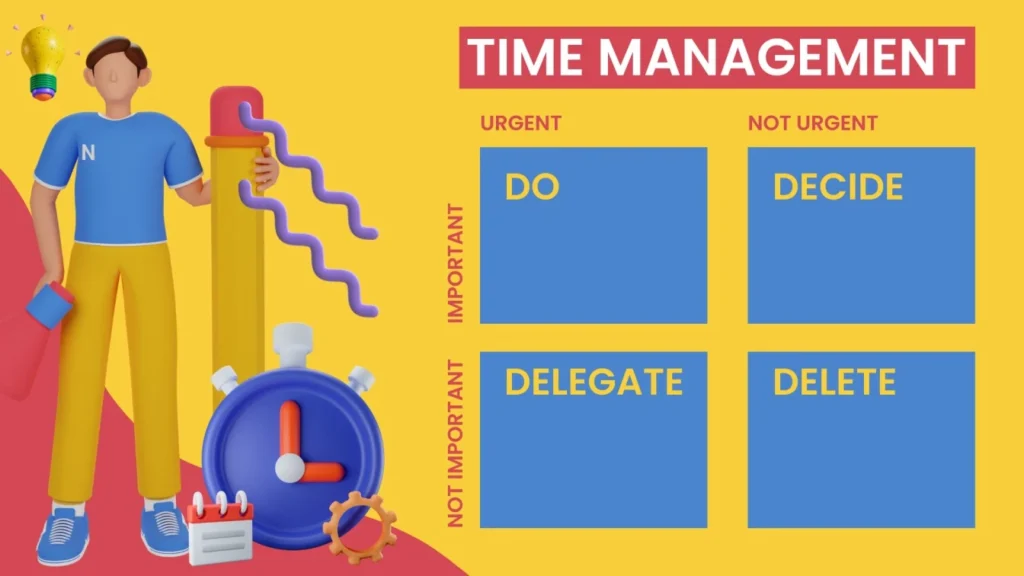Time, the elusive currency of life, is both our greatest asset and a limited resource and hence the need for its management – Time Management .

As we navigate the myriad demands of modern existence, mastering time management becomes essential for achieving our goals, nurturing relationships, and maintaining our well-being. In the quest for efficiency and balance, let’s delve into the ABCD of time management – a structured approach , a matrix that empowers us to make the most of every precious moment.
Table of Contents
A: Assess Your Priorities for effective Time Management
The first step in effective time management is assessing your priorities. Imagine your tasks as a buffet spread – you can’t possibly devour everything at once. Begin by categorizing your tasks into four categories: Must Do, Should Do, Nice to Do, and Delegate.
Must Do:
These are your high-priority tasks that align with your long-term goals. They are the main course of your productivity feast, requiring your utmost attention and focus.
Should Do:
These tasks are important but not as urgent as Must Do tasks. They’re the side dishes that enhance the flavor of your productivity meal. Allocate dedicated time to tackle them effectively.
Nice to Do
These tasks hold value but aren’t critical to your immediate goals. They’re like the appetizers – enjoyable, but not the main focus. Allocate leftover pockets of time for these tasks.
Delegate:
Just as you wouldn’t cook every dish at a feast, certain tasks are better delegated to others. Recognize tasks that can be handled by colleagues, team members, or professionals. Delegation lightens your load and empowers others to contribute.
B: Break Tasks into Manageable Chunks
Brevity is the soul of productivity. Break your tasks, especially the Must Do and Should Do items, into manageable chunks. Visualize each task as a puzzle piece, and each chunk as a section of that piece. This approach not only makes tasks less daunting but also provides a sense of accomplishment as you tick off completed chunks.
C: Combine Similar Tasks
Clutter breeds chaos, and the same applies to your task list. Combine similar tasks to streamline your workflow. Group together tasks like responding to emails, making phone calls, or conducting research. This practice minimizes mental switching costs and optimizes your focus.
D: Delegate Wisely
The power of delegation cannot be overstated. You’re not a one-person show – surround yourself with a capable ensemble. Determine tasks that can be delegated without compromising quality. Delegating tasks aligned with the skills of your team members allows them to excel and helps you focus on your unique strengths.
Delegation can be a complicated and balancing affair
Delegation, like a high-stakes juggling act, is a delicate art of finding that sweet spot between too much and too little. It’s the game where you pass the torch (or tasks, in this case) to keep the productivity fire burning. While it promises the coveted gift of time and streamlined operations, it’s not all rainbows and unicorns. Remember everyone is unique , no one can be like you , no one can produce the exact results that you do .
The 70% rule of delegation
The 70% rule of delegation suggests that if someone you’re delegating a task to can perform it at least 70% as well as you can, then it’s a suitable task to delegate. This principle is a guideline for effective delegation and time management. By entrusting tasks to others who are competent and capable, you can free up your time for more strategic or high-priority activities. Delegating tasks that fall within this 70% threshold allows you to focus on tasks that truly require your expertise and attention, while also providing growth opportunities for your team members.
As you embrace the ABCD approach, you’re not just managing time; you’re sculpting a life where productivity coexists harmoniously with your well-being. By assessing your priorities, breaking tasks into manageable chunks, combining similar tasks, and delegating wisely, you create a symphony of efficiency that resonates with your goals and values. Remember, the ABCD of time management isn’t a rigid formula; it’s a versatile framework that adapts to your needs, ensuring that you navigate your days with intention, balance, and a touch of wisdom.
Two Rules of Deligation
Rule 1: Just because you can do something doesn’t mean you should.
Rule 2: If something is on your to-do list for too long, delegate.
Mindful delegation is a powerful tool to enhance your life , to give you quality time to delve into more important doables . Click here to learn about Time Management through Mindfulness .
Ankur Warikoo has created some awesome and easy to comprehend short courseson Time Management , we at pluginfortools highly recommend them .
Click here to jump to that link , but do come back !!
